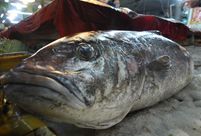 Bikini show in 2014 China Final of Miss Tourism World
Bikini show in 2014 China Final of Miss Tourism World
 Close-up view of August Aerobatic Team
Close-up view of August Aerobatic Team
 Goddesses married in 2014
Goddesses married in 2014
 Polar region photos raise worldwide awareness of global warming
Polar region photos raise worldwide awareness of global warming
 Get off at the last stop — Beijing Subway in vision
Get off at the last stop — Beijing Subway in vision
 Top 100 beauties in the world!
Top 100 beauties in the world!
 Gallery: Who is the most beautiful one?
Gallery: Who is the most beautiful one?
 If you like autumn, put your hands in the air!
If you like autumn, put your hands in the air!
 Fan Bingbing's "Queen style" in new play
Fan Bingbing's "Queen style" in new play
 Lingerie show at 2014 Miss China
Lingerie show at 2014 Miss China
The Paris-based Reporters Without Borders (RWB) released a report called the Press Freedom Barometer 2014 on Tuesday. According to the round-up of this non-governmental organization, the Chinese mainland is still the place where the greatest number of journalists is held in captivity. Among the 107 currently imprisoned journalists and netizens in China, which accounts for nearly one-third around the globe, 29 are professionals in the media industry. The RWB also ranks China as one of the worst countries in terms of the freedom of the press.
This organization claims it safeguards the rights of journalists, so even if there are some inaccuracies in this report, we, as a media agency, can be tolerant of it. But silence cannot be kept if we see a wolf in sheep's clothing. It holds strong political views and is obsessed with the supremacy of Western values.
Since the 2008 Beijing Olympic Games, China seems to have become the archenemy of the RWB, whose opposition to China has synchronized with the Western world's discomfort toward China's rise.
Chen Yongzhou, a former reporter with the New Express tabloid is included in the report. He was convicted of crimes including bribe-taking, faking news and defaming enterprises. Chen's case was sensational but his imprisonment is the result of justice being done instead of freedom of the press being crushed.
Gao Yu, a former State media journalist, is also included in the report. She was found guilty of leaking State secrets to foreign websites. Her acts are widely recognized as a felony in China, but her conviction, in the eyes of the West, constitutes some kind of crackdown on press freedom.
It's very hard to track some of the names on the "list of prisoners" to discern their real identities and relevant backgrounds, even though they were reportedly working for State media.
There are also 25 "journalists" who were lamas, a title for a teacher of the Dharma in Tibetan Buddhism, freelancers and posters with some illegal and private publications, and teachers.
We can tell from the list that the RWB harbors ulterior motives instead of being really committed to supporting Chinese journalism. What intrigues it is simply the attempt to put a label on the Chinese government, which says "suppressor of freedom of the press." However, without sufficient evidence, if there is any, its accusations are too groundless to be true.
Chinese journalists do not enjoy free speech as their Western counterparts do, but being detained or arrested by the government is certainly not the normal state of their work and life.
Chinese journalists, if they crossed some "red lines" at work, will be criticized or disciplined by their superiors. But their personal safety is always well-protected.
Some individual media professionals in China become defendants in court cases because they have engaged in some illegal activities. Their profession as journalists has nothing to do with the punishment they deserve.
The RWB has reduced itself to a propaganda tool for Western values. Publicity stunts won't help it earn the respect of journalists around the globe.
 Joint anti-piracy drill
Joint anti-piracy drill Unknown 'monster' fish caught in Shandong
Unknown 'monster' fish caught in Shandong 20 years on: Relocated Three Gorges residents through lens
20 years on: Relocated Three Gorges residents through lens Beautiful Chinese woman
Beautiful Chinese woman Chestnut girl goes viral online
Chestnut girl goes viral online PLA HK Garrison veterans leave behind beautiful smiles
PLA HK Garrison veterans leave behind beautiful smiles Victoria's Secret Fashion Show
Victoria's Secret Fashion Show Representative beauties
Representative beauties Excellent photos of Zhuhai Air Show
Excellent photos of Zhuhai Air Show Blood and terror
Blood and terror China needs clear strategy to help Russia
China needs clear strategy to help Russia Beijing grapples with overflowing garbage problems
Beijing grapples with overflowing garbage problems A roundup of some of the key phrases and events of 2014
A roundup of some of the key phrases and events of 2014Day|Week|Month